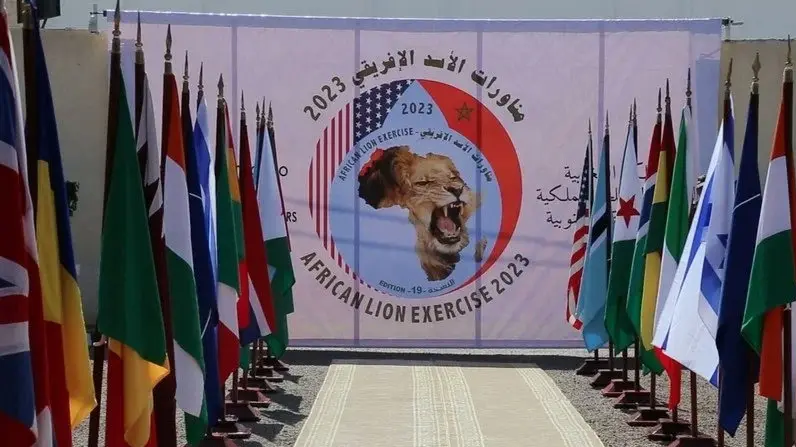The Moroccan armed forces and their American counterparts announced on June 5, the launch of the nineteenth edition of the “African Lion” military maneuvers in Morocco, which will continue until the 16th of June. These maneuvers come despite the continuing tensions between Morocco and Algeria over the Western Sahara, the US President, though, has continued to recognize the territory as a part of Morocco. These manuevers aim to combat the increase in terrorist activity on the African continent, and to counter the growing influence of China and Russia in Africa.
Several Gains
Despite the calls of a number of lawmakers and some American personalities, led by former Republican Senator James Inhofe, President Joe Biden’s administration not to conduct the annual “African Lion” maneuvers in Morocco, the organization of the maneuvers during the current stage includes many gains for the United States of America, most notably the following:
- Expanding coordination with African militaries: With Tunisia, Ghana, and Senegal joining this year in the African Lion exercise, a third of the African continent will be involved in the maneuvers. According to Major General Brian Cashman, Deputy Commander-in-Chief, Task Force Southern Europe, during his commencement speech, US is aiming through these maneuvers, to include its partners and allies, and to develop the readiness and efficiency of the US Army and the armies’ participating in the maneuvers. The US is also aiming to strengthen the joint defense capabilities of Africa to confront rising threats and challenges across borders and extremist and violent organizations in the African Sahel region, which is a priority for the US military leadership in Africa (AFRICOM).
The Chief of Staff, Lieutenant General Joel Tyre, said that the maneuvers are an essential pillar of the “AFRICOM” strategy. The US aims to enhance military cooperation with the with Africa to compensate the French withdrawal from the Sahel region in west Africa by strengthening US military presence in the region. The US is also stepping up its involvement in West Africa, given the rise of terrorist activities in the region.
- Consolidation of US-Moroccan bilateral relations: Morocco’s hosting of the multinational “African Lion” maneuvers reflects the level of strong strategic cooperation with the United States of America and reinforces Morocco’s centrality in The US’s strategy to enhance US influence on the African continent, as successive US administrations view Morocco as a strategic ally. From outside the North Atlantic Treaty Organization (NATO), the maneuvers support the efforts made by the Biden administration to focus the US-Moroccan partnership on operational cooperation in the American interest, especially the joint US-Moroccan efforts to combat terrorism, and cooperation to monitor and confront the movement of fighters in terrorist organizations through Border crossings and exchange of information regarding them, as well as joint cooperation in imposing a security balance in the Sahel and Sahara region.
- Confronting Chinese and Russian military influence: The “African Lion” maneuvers come as part of a comprehensive strategy adopted by the US to confront rising Chinese influence in Africa. Chinese influence is no longer limited to the economic and trade level, but is now including the aspect of military cooperation. US reports discuss the efforts by China to establish a new military presence on the west coast of Africa, after establishing in 2017 its first overseas military base in Djibouti.
The US aims to confront moves taken by Russia to strengthen its African alliances with the aim of breaking isolation and the impact of sanctions imposed by the US on Russia in the wake of the outbreak of the Russian-Ukrainian war, today the Russian – Ukrainian war has entered its second year. The US is also aiming to undermine the influence of the Wagner mercenary group in African countries, as Wagner aims to fill the void from the withdrawal of the French forces from the Sahel region in west Africa. Wagner has also provided military support to internal political and military forces in African countries exacerbating any internal conflicts.
- Strengthening Moroccan Israeli cooperation: In addition to the military objectives of the “African Lion” maneuvers, Israel’s participation in them for the first time reveals the desire of President Joe Biden’s administration to further consolidate Israeli Moroccan relations, which are witnessing an acceleration in cooperation since the normalization of relations in December 2020. Morocco and Israel agreed, last January, to expand the scope of their military cooperation including air defense and electronic warfare after signing a security cooperation agreement on November 24, 2021. The agreement included cooperation in the defense industry and the transfer of technology, additionally media reports indicate that Morocco obtained advanced Israeli weapons, including drones.
These moves came after the US Department of Defense transferred Israel, from the area of operations of the US European Command (EUCOM) to the scope of work of the US Central Command (CENTCOM). This move aimed to improve regional cooperation with Israel to confront common threats. It is worth noting that the Pentagon referred to the peace agreements between Israel and a number of Arab countries, including Morocco, as a strategic opportunity to unite the partners of the US in facing common threats in the Middle East.
Three-Pronged Strategy
The “African Lion” maneuvers come in light of the growing interest of the United States of America in the African continent, which has become an arena for competition between it on the one hand, and China and Russia on the other. The maneuvers are one of the pillars of the US strategy, which includes a three-pronged approach. The first dimension is the diplomatic track, which was expressed by the multiple visits of US administration officials, led by US Secretary of State Anthony Blinken, to some countries of the continent, and the White House hosting the second summit of leaders of the United States of America and Africa from 13 to 15 last December, which carried Emphasizing US commitments to African countries, as well as the importance of mutual relations, and increasing cooperation on common global priorities.
The second dimension is related to US humanitarian and development aid through the US Agency for International Development, which works to strengthen the role of the US administration in helping African countries mitigate the effects of the Covid-19 pandemic and future epidemics, enhance food security, and respond to the climate change crisis.
While the third dimension is related to military cooperation, which comes within the framework of the “African Lion” maneuvers, which aim to enhance military cooperation between the United States of America, its allies, and African countries to confront the growing security threats, especially terrorism, which still represents the first challenge to the security and stability of the countries of the continent and the achievement of prosperity for all its countries.


